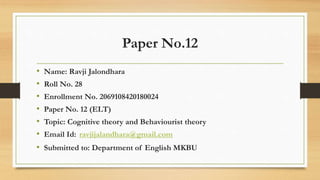Presentation 12
•Download as PPTX, PDF•
0 likes•47 views
Cognitive theory and behaviourist theory
Report
Share
Report
Share

Recommended
Recommended
More Related Content
What's hot
What's hot (18)
Learning (Psychology) Lecture notes by Imran Ahmad Sajid

Learning (Psychology) Lecture notes by Imran Ahmad Sajid
Similar to Presentation 12
Similar to Presentation 12 (20)
School psychology, intervention and assessment in school psychology

School psychology, intervention and assessment in school psychology
Bihavioral change and decision making asignment by tariku bachano

Bihavioral change and decision making asignment by tariku bachano
More from Ravjibhai1994
More from Ravjibhai1994 (15)
Recently uploaded
Making communications land - Are they received and understood as intended? webinar
Thursday 2 May 2024
A joint webinar created by the APM Enabling Change and APM People Interest Networks, this is the third of our three part series on Making Communications Land.
presented by
Ian Cribbes, Director, IMC&T Ltd
@cribbesheet
The link to the write up page and resources of this webinar:
https://www.apm.org.uk/news/making-communications-land-are-they-received-and-understood-as-intended-webinar/
Content description:
How do we ensure that what we have communicated was received and understood as we intended and how do we course correct if it has not.Making communications land - Are they received and understood as intended? we...

Making communications land - Are they received and understood as intended? we...Association for Project Management
https://app.box.com/s/7hlvjxjalkrik7fb082xx3jk7xd7liz3TỔNG ÔN TẬP THI VÀO LỚP 10 MÔN TIẾNG ANH NĂM HỌC 2023 - 2024 CÓ ĐÁP ÁN (NGỮ Â...

TỔNG ÔN TẬP THI VÀO LỚP 10 MÔN TIẾNG ANH NĂM HỌC 2023 - 2024 CÓ ĐÁP ÁN (NGỮ Â...Nguyen Thanh Tu Collection
Recently uploaded (20)
UGC NET Paper 1 Mathematical Reasoning & Aptitude.pdf

UGC NET Paper 1 Mathematical Reasoning & Aptitude.pdf
Salient Features of India constitution especially power and functions

Salient Features of India constitution especially power and functions
General Principles of Intellectual Property: Concepts of Intellectual Proper...

General Principles of Intellectual Property: Concepts of Intellectual Proper...
ICT Role in 21st Century Education & its Challenges.pptx

ICT Role in 21st Century Education & its Challenges.pptx
Micro-Scholarship, What it is, How can it help me.pdf

Micro-Scholarship, What it is, How can it help me.pdf
Making communications land - Are they received and understood as intended? we...

Making communications land - Are they received and understood as intended? we...
TỔNG ÔN TẬP THI VÀO LỚP 10 MÔN TIẾNG ANH NĂM HỌC 2023 - 2024 CÓ ĐÁP ÁN (NGỮ Â...

TỔNG ÔN TẬP THI VÀO LỚP 10 MÔN TIẾNG ANH NĂM HỌC 2023 - 2024 CÓ ĐÁP ÁN (NGỮ Â...
Unit 3 Emotional Intelligence and Spiritual Intelligence.pdf

Unit 3 Emotional Intelligence and Spiritual Intelligence.pdf
Presentation 12
- 1. Paper No.12 • Name: Ravji Jalondhara • Roll No. 28 • Enrollment No. 2069108420180024 • Paper No. 12 (ELT) • Topic: Cognitive theory and Behaviourist theory • Email Id: ravjijalandhara@gmail.com • Submitted to: Department of English MKBU
- 2. Cognitive Theory: • Cognitive theory is a learning theory of psychology that attempts to explain human behavior by understanding the thought processes. • Cognition-refers to individual thoughts, knowledge, interpretation, understanding or views about oneself and his/her environment.
- 3. Continue... • Edward Tolman- Rats- learn to run through a complicated web/network towards their goal of food, rat founded out some cue to reach the goal. • Theory recognizes the role of organism in receiving, memorizing, retrieving and reacting.
- 4. Main Assumptions: • Learning results from internal mental activity and not from externally imposed stimuli. • The learner comes with knowledge, skills and related experiences to the learning situation.
- 5. Role of the Learner: • Active participants in the learning process, using various strategies to process and construct their personal understanding of the contents to which they are exposed.
- 6. Cognitive view of learning: • In the cognitive view, people draw on their experiences and uses past learning as a basis for present behavior. • For example, an employee faced with a choice of job assignments will use previous experiences in deciding wich one to accept. • People make choices about their behavior. The employee recognises two alternatives and choose one.
- 7. Behaviourist Theory: • This theory implies that the Learner responds to environmental stimuli without his/her mental state being a factor in the learner’s behavior. • Individuals learn to behave through conditioning. • Two types of conditioning: • 1) Operant Conditioning • 2) Classical Conditioning
- 8. Ivan Pavlov’s Classical Conditioning
- 9. Classical Conditioning • Classical conditioning can face extinction where the learning is undone. • This can happen naturally(the dog stops getting meat when music is played). • Or can happen through some type of therapy in the case of sever anxiety reactions. • Ex.. People who are afraid to fly...
- 10. ... • Classical conditioning is more than forming an association, it is an involuntary, physiological response. • The point is, we learn to associate a stimulus with a response and eventually our body does this automatically in the presence of the stimulus. Our response is in voluntary.
- 11. Conclusion: • Behaviourist theory focuses on observable changes in outward behavior and on the impact of external stimuli to effect change. • Cognitive theory focuses on the internal mental processes, how they change and how they affect external behavior changes.